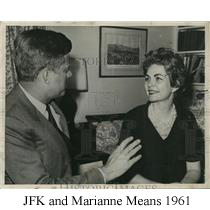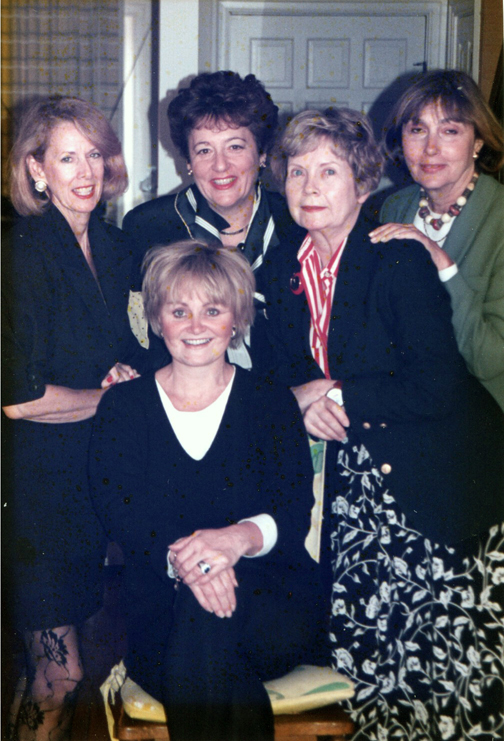Remembering Marianne Means
by Kitty Kelley
I’d much rather be hoisting a glass with Marianne Means, and hearing her rant about “that vulgarian” in the White House than writing this valedictory, but she went to the angels a few days ago, and her death leaves me with an empty glass, albeit a full heart.
 You may have noticed The Washington Post gave her a large obituary, and applauded her as a “trailblazing White House correspondent,” which led to 50 successful years as a syndicated columnist for Hearst newspapers. The obit mentioned that Marianne made a crucial connection as a college student with then-Sen. John F. Kennedy, when he was campaigning for President in Nebraska. In the White House he sought to help her make her way amidst a predominantly male press corps.
You may have noticed The Washington Post gave her a large obituary, and applauded her as a “trailblazing White House correspondent,” which led to 50 successful years as a syndicated columnist for Hearst newspapers. The obit mentioned that Marianne made a crucial connection as a college student with then-Sen. John F. Kennedy, when he was campaigning for President in Nebraska. In the White House he sought to help her make her way amidst a predominantly male press corps.
“Give her some stories,” the President told one aide. “Give her all the help you can.”
For anyone who knew Marianne then as a pretty blue-eyed blonde—“farm fresh,” recalled one photographer—and JFK as an inveterate chaser, certain assumptions were made, and those assumptions were to Marianne’s advantage, although her romance then was not with Kennedy, but with his deputy press secretary.
I met her many years later in Georgetown, where she lived all of her life since moving from her parents’ farm. She graduated from the University of Nebraska with a Phi Beta Kappa key, and later earned a law degree from George Washington University. We lived near each other, shared the same hairdresser and many mutual friends. Marianne was great fun, wonderfully opinionated, and breezily direct about everything—except for her husbands and lovers. By the end of her life she’d collected five of the former and lots of the latter, but she did not kiss and tell. She would’ve been appalled by #MeToo.
Before Pamela Harriman arrived in Washington, Marianne Means was entertaining presidents, vice presidents, senators and congressmen. “Not all at once, mind you. I saved Lyndon Johnson for a special group of people,” she told me in 1973 when I was writing an article about dinner parties. “As President he came to my house two times. Both times Lady Bird was out of town and both times he approved the guest list in advance.” I asked if she catered an elaborate menu for her illustrious guest. “Can you believe it? I actually cooked it myself,” she said. “The President was not a fussy eater, thank God, so I could get away with a simple dinner of roast beef, which was good because I’m just a plain old meant-and-potatoes girl.”
In the article I mentioned her cat had jumped on President Johnson’s lap. After publication Marianne corrected me: the cat had jumped on the roast beef.
When I was thinking about writing a book on Georgetown as the nexus of power and influence in Washington, D.C., Marianne was my go-to source. She knew that few places in the U.S. carried the panache of instant recognition like the 12 square blocks in the middle of the nation’s capital, which have been home to presidents and prostitutes, senators and scalawags, congressmen and convicts. Even when I decided not to write the book, we’d still meet for dinner at La Chaumiere, where she would be wheel-chaired in by one of her devoted caregivers.
One night she began talking about LBJ, and I gave her the girlfriend-to-girlfriend look. She laughed, but wouldn’t say another word. I mentioned the many references to her in President Johnson’s daily White House diaries from 1964-1967.
“Okay,” she said. She paused for a long minute. “Yes, it was an affair and, no, I won’t share it with people, not even you. It was mine and he was mine.” She was serious, almost fierce, and I realized that Lyndon Baines Johnson had been enormous in her life. Later that was confirmed when I read John Seigenthaler’s oral history in the John F. Kennedy Library regarding the 1964 Democratic National Convention when Robert Kennedy was given a monumental ovation The rancor between then-President Johnson and former Attorney General Kennedy was visceral. Seigenthaler, administrative assistant to Kennedy in the Justice Department, was a close personal friend. Flying back to Washington on the press plane after the convention, he recalled: “I remember Marianne Means who loved Lyndon and really worked on Bob. She was always a friend of mine. [But] I was cold to her on the flight that night.”
During out last dinner Marianne said to me: “I think it’s terrible Johnson has not gotten his due as a great president and he was a great president. Look at all he did for civil rights.”
I agreed, then whispered, “Vietnam.”
“Pew,” she said. (Yes, “pew” was her exact quote.) “Vietnam was started by another president…. Johnson made sure both his sons-in-law [Patrick Nugent and Charles Robb] served—in safe positions, of course, but both went to Vietnam…. Ben Barnes [former Lt. Gov. of Texas] is now the leading guy for helping us try to restore Johnson’s place in history.”
She talked about inviting President Johnson to one of her weddings. “I think it was my second or third…. It was in my small house on 32nd Street. Johnson came. My relatives still remember how they had left something in the car and had to run outside to get it but couldn’t get back in because of the Secret Service.”
“Must be nice to have a lover who is protected at all times,” I said.
“Nice try, Kitty Poo, but I still won’t tell you.”
We both laughed at my clumsy effort to get more information, and now she, God bless her, gets the last laugh.

Photo: Kitty Kelley (seated); Standing, left to right: Barbara Dixon, Susan Tolchin, Marianne Means and Sandra MacElwaine.
Crossposted with The Georgetowner

#MeToo is a movement to end sexual abuse. It has nothing to do with gratuitously disclosing the details of consensual relationships.